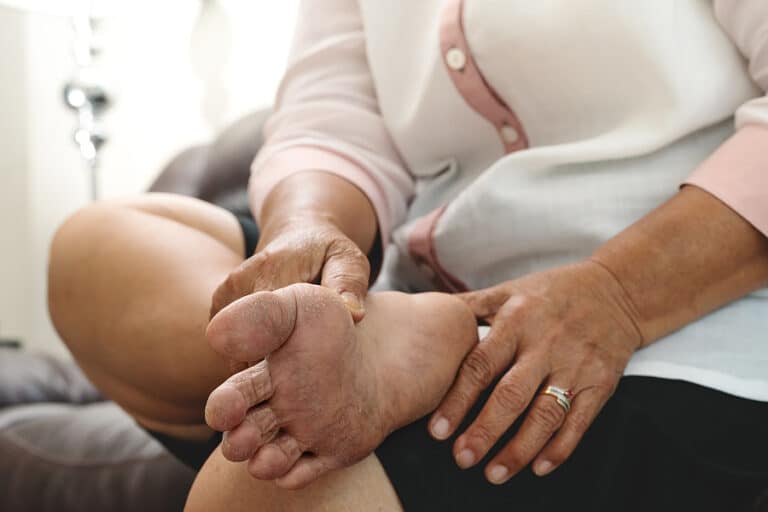Foot care among healthy individuals is often neglected, but for those with diabetes, the importance of daily foot management cannot be overstated. Diabetes can cause nerve damage in the extremities, known as peripheral neuropathy. Over time, uncontrolled high blood sugar levels can harden the arteries, leading to poor circulation in the feet. Additionally, high blood glucose levels can thicken capillary walls, reducing blood flow to the skin, arms, legs, and feet. Due to nerve and circulation damage, people with diabetes are less likely to feel foot injuries.
For example, a small pebble in your shoe might cause significant irritation and discomfort for a healthy person, but someone with diabetic neuropathy may not feel it at all. This unnoticed and untreated minor injury can lead to serious complications if it becomes infected. According to Statistics Canada, 1 in every 5 seniors is diagnosed with diabetes, and 15 percent of this population experiences foot ulcers. By following preventive measures and a daily foot care regimen, the risk of developing foot ulcers can be significantly reduced. Let’s explore some preventative measures and daily foot care steps to ensure your foot health.
Daily foot care steps and general recommendations:
Much like having a first aid kit for emergencies is essential, having a foot care kit for daily care is a great way to stay prepared. Diabetes Canada recommends including these items in your kit: nail clippers, nail file, lotion, and a non-breakable hand mirror.
- Remove your socks and inspect your feet every day. As you inspect your feet, feel for differences in skin temperature, taking note of areas of redness, swelling or increased warmth.
- If you are cutting your own toenails, be sure to cut in a straight line to avoid ingrown toenails.
- It is recommended that you wash your feet with warm water and use a mild soap. Avoid highly scented, abrasive soaps and body washes. Do not soak your feet as this can dry out your skin, potentially causing skin breakdown.
- Pat your feet dry, taking special care to dry well between your toes.
- Using your mirror, check the bottoms of your feet for cracks, blisters, or cuts. Inspect your toes, toenails and between your toes for any sign of injury as well. If you have difficulty with your vision, ask your caregiver or family member to look for you.
- Wear clean, breathable cotton socks every day.
- Be sure to apply a good quality lotion to your feet, taking care to avoid putting lotion in-between your toes, as the excess moisture can promote fungal infections.
- Wear well-fitted shoes (shoes provided and fitted by a trained orthotist is best) As the cost for orthotic made shoes are high, you may decide to shop at a regular shoe store. As recommended by Diabetes Canada, be sure to buy, supportive, low heel (less than 5cm) and should not rub or pinch. Buy shoes in the late afternoon to accommodate swelling that usually occurs that time of day.
- Elevate your feet when you are sitting. Spend time wiggling your toes and move your ankles around for a few minutes each day to improve your circulation to your feet and legs.
- Do not use over-the-counter medications to treat corns and warts. Be sure to have a health care professional trained in this area to treat you, as over the counter may cause more harm than good.
- Never go barefoot, even indoors.
When to seek medical attention:
- If you experience any swelling, redness, changes in skin temperature, or pain in your feet, ankles or legs, be sure you see your doctor right away.
- If you notice any corns (thick or hard skin on toes), calluses, in-grown toenails, warts or slivers, have them treated by your doctor or a foot care specialist.
- Unusual or persistent foot odor, which might indicate an infection.
- If you have persistent pain or discomfort.
- Cuts, blisters, cracks or sores that do not start to heal in a few days.
Early intervention can prevent minor issues from becoming serious complications. Regular check-ups with a healthcare provider specializing in diabetic foot care are also recommended. Additionally, Serving Hands Senior Care offers the services of a certified foot care nurse who can visit your home to preform foot care, conduct foot checks, and provide recommendations if you need further assistance. Please reach out to our main office at 780-963-1516 for more information.
For additional information about “Daily Diabetic Foot Care”, visit our Facebook page to watch a short educational video filled with helpful tips.
- Seeing Clearly: Glaucoma Awareness for Seniors - March 10, 2025
- The Sounds of Life: Hearing Aid Care for Seniors - March 3, 2025
- Save a Life Today!! ❤️ - February 18, 2025








